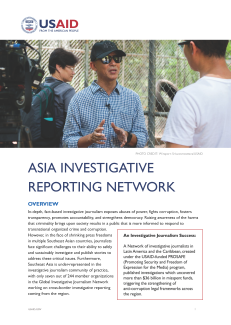OVERVIEW
In-depth, fact-based investigative journalism exposes abuses of power, fights corruption, fosters transparency, promotes accountability, and strengthens democracy. Raising awareness of the harms that criminality brings upon society results in a public that is more informed to respond to transnational organized crime and corruption. However, in the face of shrinking press freedoms in multiple Southeast Asian countries, journalists face significant challenges to their ability to safely and sustainably investigate and publish stories to address these critical issues. Furthermore, Southeast Asia is under-represented in the investigative journalism community of practice, with only seven out of 244 member organizations in the Global Investigative Journalism Network working on cross-border investigative reporting coming from the region.
Sustaining cross-border and regional collaboration requires long-standing engagement to cultivate common purpose. Through the Asia Investigative Reporting (AIR) Network, USAID will leverage experience supporting successful locally-led journalism network models in Europe and Eurasia as well as in Latin America and the Caribbean. USAID will provide dedicated financial and technical support to connect investigative journalists and relevant stakeholders in at least six Southeast Asian countries. This will entail deliberate network-building, localized capacity and leadership development, institutionalized collaboration, and sustained support and resourcing for cross-border reporting projects on transnational crime and corruption that affect the everyday lives of citizens in the region and beyond.
OBJECTIVES
- Locally-led investigative journalism network supported and strengthened;
- Investigative reporting in Asia has enhanced audience engagement, is amplified through relevant information channels, and impacts society; and
- More proactive, comprehensive approaches to safety and security for investigative journalists are developed and advanced.
ANTICIPATED RESULTS
- A Southeast Asian Investigative Journalism Network fosters trust-based cross-border collaboration among journalists in at least six countries.
- Journalists’ investigative journalism skills and knowledge strengthened.
- Stronger mutual collaboration between media and civil society for greater quality, reach, and impact of investigative reporting.
- Diversified access to opportunities and leadership within the investigative journalism profession.
- Improved journalists and newsrooms’ security practices and risk mitigation.
For more information, please visit www.usaid.gov/asia-regional or email info-rdma@usaid.gov.


